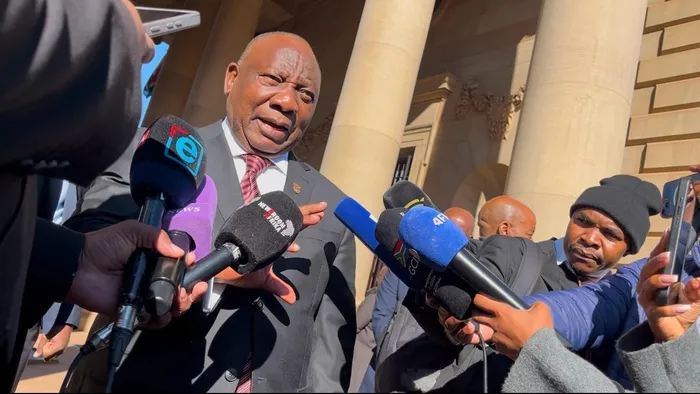Ramaphosa admits SA is reeling from US tariffs, but insists it is not alone

President Cyril Ramaphosa says the United States' 30% tariff on South African imports is a harsh wake-up call, but insists the country is not alone.
Image: Kamogelo Moichela/IOL Politics
President Cyril Ramaphosa has conceded that South Africa is grappling with the United States’ decision to impose a 30% tariff on local imports, but insists the country is not alone in facing mounting global trade challenges.
In his weekly newsletter, Ramaphosa described the new US tariffs as a stark reminder of the urgent need to adapt to increasingly turbulent headwinds in international trade.
“The US is South Africa’s second-largest trading partner by country, and these measures will have a considerable impact on industries that rely heavily on exports to that country and on the workers they employ, as well as on our fiscus,” he said.
Sectors such as agriculture, automotive and textiles have historically benefited from duty-free access to the US market under the African Growth and Opportunity Act (AGOA), which now faces disruption.
Ramaphosa said that South Africa’s trade relationship with the US has historically been complementary, saying local exports “do not compete with US producers and do not pose a threat to US industry”.
“Largely, our exports are inputs into US industries and therefore support the United States’ industrial base,” he said.
“South Africa is also the biggest investor from the African continent into the US, with 22 of our companies investing in a number of sectors including mining, chemicals, pharmaceuticals and the food chain.”
The 30% tariff was recently announced by the Trump administration and will take effect on 7 August.
South Africa is the only country in sub-Saharan Africa singled out for the steep tariff, reflecting deteriorating relations between Pretoria and Washington.
Other African countries, such as Lesotho and Zimbabwe, will face a 15% tariff from the same date.
The announcement is a significant blow to South Africa’s economy, particularly as the government had been working to strengthen trade ties with the US.
This included deals on liquefied natural gas imports, easing poultry import regulations and investments in US industries.
Ramaphosa defended South African imports, arguing they ultimately benefit US consumers through greater variety and lower costs.
“For example, citrus production is counter-seasonal and does not pose a threat to US production,” he said.
“Furthermore, production by US companies has been on the decline due to low yields, citrus greening disease and other factors unrelated to competition from imports.”
South Africa, the world’s second-largest citrus exporter, has helped to stabilise supply and prices in the US market.
“We have been engaging the United States to enhance mutually beneficial trade and investment relations. All channels of communication remain open,” said Ramaphosa.
“Our foremost priority is protecting our export industries.”
He said the government would continue to engage with US officials while also accelerating efforts to diversify export markets, particularly within Africa.
“With a view to helping our producers and exporters aggressively explore alternative markets, we have established an Export Support Desk to assist affected producers,” he said.
Ramaphosa added that details of a support package for companies, producers and workers impacted by the tariffs would be announced soon.
He said the intervention would also assist industries seeking to expand into regions such as the rest of Africa, Asia, the Middle East and other existing trade agreement markets.
“Strengthening regional value chains will be key to building resilience for our export markets in the longer term,” he said.
“Much as strengthening and establishing alternative value chains will take time, this moment presents us with an opportunity to push forward with the implementation and expansion of the African Continental Free Trade Area (AfCFTA).”
Ramaphosa stressed the need to reduce South Africa’s dependence on specific export markets, calling it a “strategic imperative” to build economic resilience.
“In the coming months, we will be scaling up our trade missions into new markets in Africa and beyond, as well as the National Exporter Development Programme, whose aim is to grow the pool of export-ready companies,” he said.
Trump has opposed several South African policies, including land expropriation, which he controversially claimed allowed land to be taken from white farmers.
The Presidency has firmly denied such claims, including that one of genocide on white farmers.
Ramaphosa met with Trump in May in a bid to mend relations, but no progress was made as things had gone worse.
Despite growing tensions, Ramaphosa insisted that South Africa is not alone in facing high tariffs.
“A number of export-reliant developed and developing economies, including several on the continent, are also grappling with these measures,” he said.
“The international trading system is changing. Complacency will not serve us, and building resilience is imperative.”
Meanwhile, the Minister of Departments of Trade, Industry and Competition Parks Tau and Minister of International Relations and Cooperation Ronald Lamola will be having a joint press briefing on Monday morning to address the issue of high tariffs.
The briefing will take place at 10 a.m. at the Germiston Civic Centre, in Ekurhuleni.
Meanwhile on Saturday, ANC NEC member Dr Kgosientsho Ramokgopa told journalists there had been a “spirited and robust” discussion on the US tariffs.
He said negotiations between the US and South Africa were ongoing, and expressed confidence that the two nations “would be able to find each other”.
simon.majadibodu@iol.co.za
IOL Politics